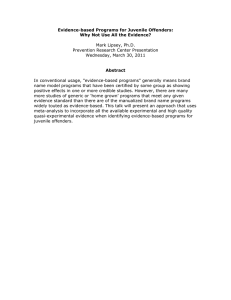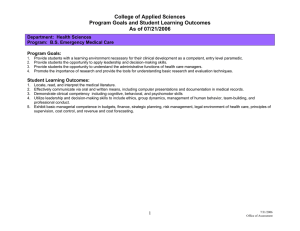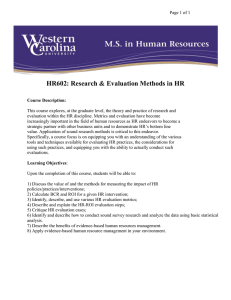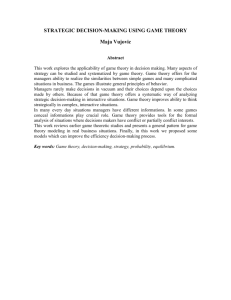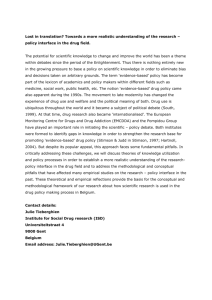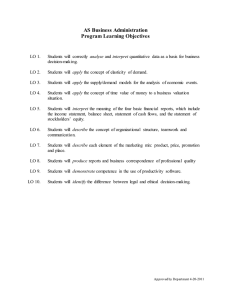Post-Graduate Certificate in Course overview:
advertisement
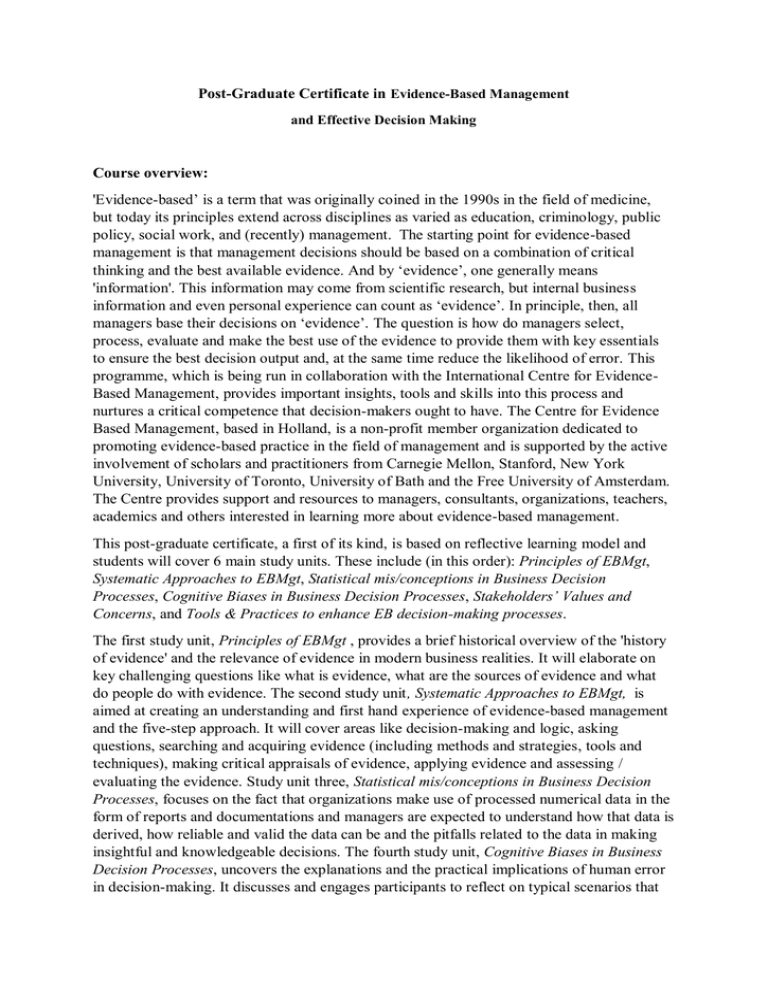
Post-Graduate Certificate in Evidence-Based Management and Effective Decision Making Course overview: 'Evidence-based’ is a term that was originally coined in the 1990s in the field of medicine, but today its principles extend across disciplines as varied as education, criminology, public policy, social work, and (recently) management. The starting point for evidence-based management is that management decisions should be based on a combination of critical thinking and the best available evidence. And by ‘evidence’, one generally means 'information'. This information may come from scientific research, but internal business information and even personal experience can count as ‘evidence’. In principle, then, all managers base their decisions on ‘evidence’. The question is how do managers select, process, evaluate and make the best use of the evidence to provide them with key essentials to ensure the best decision output and, at the same time reduce the likelihood of error. This programme, which is being run in collaboration with the International Centre for EvidenceBased Management, provides important insights, tools and skills into this process and nurtures a critical competence that decision-makers ought to have. The Centre for Evidence Based Management, based in Holland, is a non-profit member organization dedicated to promoting evidence-based practice in the field of management and is supported by the active involvement of scholars and practitioners from Carnegie Mellon, Stanford, New York University, University of Toronto, University of Bath and the Free University of Amsterdam. The Centre provides support and resources to managers, consultants, organizations, teachers, academics and others interested in learning more about evidence-based management. This post-graduate certificate, a first of its kind, is based on reflective learning model and students will cover 6 main study units. These include (in this order): Principles of EBMgt, Systematic Approaches to EBMgt, Statistical mis/conceptions in Business Decision Processes, Cognitive Biases in Business Decision Processes, Stakeholders’ Values and Concerns, and Tools & Practices to enhance EB decision-making processes. The first study unit, Principles of EBMgt , provides a brief historical overview of the 'history of evidence' and the relevance of evidence in modern business realities. It will elaborate on key challenging questions like what is evidence, what are the sources of evidence and what do people do with evidence. The second study unit, Systematic Approaches to EBMgt, is aimed at creating an understanding and first hand experience of evidence-based management and the five-step approach. It will cover areas like decision-making and logic, asking questions, searching and acquiring evidence (including methods and strategies, tools and techniques), making critical appraisals of evidence, applying evidence and assessing / evaluating the evidence. Study unit three, Statistical mis/conceptions in Business Decision Processes, focuses on the fact that organizations make use of processed numerical data in the form of reports and documentations and managers are expected to understand how that data is derived, how reliable and valid the data can be and the pitfalls related to the data in making insightful and knowledgeable decisions. The fourth study unit, Cognitive Biases in Business Decision Processes, uncovers the explanations and the practical implications of human error in decision-making. It discusses and engages participants to reflect on typical scenarios that are error prone due to the misinterpretation or misperception of the evidence, and thus illustrates ways to avoid them or at least be aware of them. The fifth study unit, Stakeholders’ Values and Concerns, propagates the argument that evidence exists within a context, in this case organizational and institutional contexts. Decision-making is not a mere straight-forward cognitive process but is also embedded within a socio-emotional environment which is dynamic and interactive. Therefore, the implications of evidence-based management will be discussed within broader issues like the role of stakeholders, organizational values, power effects on the interpretation of evidence, politics in organizations, the phenomenon of knowledge hiding and knowledge hoarding, and the effects of multiculturalism in organizations on decision-making. The last study unit, Tools & Practices to enhance EB decision-making processes, is purposely intended to wrap up the knowledge, insights and learning experiences gained by participants through the previous five study units. It will be practice- and seminar- based and will focus on activities, many of them developed by the Centre for Evidence-based Management, to ensure that participants have 'captured' the principles and issues relevant to evidence-based management. Course intended for: This programme is primarily intended for practitioners and decision-makers in industry who have to deal, absorb, select and evaluate large masses of information and data as part of their decision-making processes. While the programme will primarily be of potential interest to managers, other participants from other occupational areas (like teachers and policy making) will also benefit tremendously. Learning outcomes: The course has the following specific learning outcomes: 1. To gain a knowledgeable opinion of the concept of 'evidence' in organizations 2. To develop an understanding of the critical relevance of using evidence in decisionmaking 3. To evaluate data from a critical point of view 4. To contextualize the role of systems in decision-making 5. To develop an awareness that data is contextualized and has political, social and economic implications in the way it is adopted and used 6. To learn how to review evidence 7. To improve one's capabilities in processing and evaluating data and other sources and forms of evidence 8. To develop ways and means to collect, analyze and evaluate data in a more systematic and effective manner 9. To improve skills of analyses in decision making Career opportunities & access to further study: There are no specific career titles associated with Evidence-Based Management. However, as organizations (public and private) become more complex, managers need to be more than just aware of this complexity. An insightful development in EBMgt will ensure that managers can critically understand the processes and the methods for better decision making and also understand more in depth the tools and criteria necessary to carry out such a task. On the other hand, EBMgt is still in its infancy even though its need has been felt for many years. It is hoped that this field will grow as a discipline in its own right and will trigger research opportunities to assist both organizations and managers to reduce the risk of erring in decision-making.
